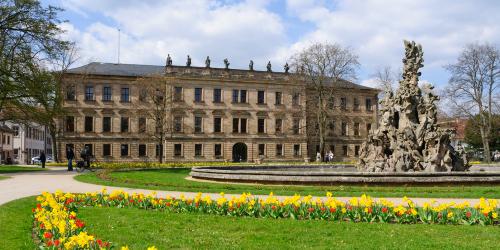
Erlangen, Germany
Origin of the partnership
The two German cities of Jena and Erlangen are linked by a particularly intensive and distinctive partnership.
On March 19, 1987, the town twinning was decided in the Erlangen City Council and sealed in writing on April 8, 1987 in Jena. At the time, the Bavarian city made great efforts to cooperate, not least in order to make a contribution to a united Germany. In 2010, the partnership was awarded the Unity Prize, which was presented to the mayors of the cities by the then Federal Minister of the Interior Thomas de Maiziére.
Intensive exchange has been possible since the fall of the inner-German border in November 1989, with the first contacts being established primarily through the university environment.
Today there are well-established administrative contacts as well as lively contacts between the citizens of both cities.
Society and geography
Erlangen is located around 180 km north of the state capital Munich on the northern edge of the central Franconian economic conurbation of Nuremberg-Fürth-Erlangen-Schwabach and is easily accessible by car (A3 and A73 highways), rail (Nuremberg-Berlin) and air (Nuremberg Airport).
The average altitude of the city is 279 meters above sea level (railroad station).
Erlangen is divided into nine districts and 40 boroughs, in which a total of around 112,800 inhabitants are registered. These are made up of 150 nationalities, including 8 % Turks, 7 % Indians and 6 % Chinese and Italians. The proportion of foreigners in the city is therefore around 18.4 %, which indicates Erlangen's high level of internationality.
Thanks to the approximately 40,000 students at Friedrich-Alexander-Universität Erlangen-Nürnberg (FAU), the city also has a very young and open population.
Culture and education
In addition to the FAU, there is a selection of numerous other research institutions in the city. Among them:
- Siemens Research Center
- Innovation and Start-up Center (IGZ)
- Innovation Center for Medical Technology and Pharmaceuticals (IZMP)
- Fraunhofer Institute for Integrated Circuits (IIS)
- Fraunhofer Institute for Integrated Systems and Device Technology (IISB)
- Bavarian Laser Center
- Max Planck Research Group Optics, Information and Photonics
- ZAE - Center for Applied Energy Research
- Software Support Center Nuremberg Region Modern research laboratory of the FAU
Erlangen is also broadly positioned in cultural aspects.
Permanent exhibitions in the Erlangen Art or City Museum and the sculpture gardens in Tennenlohe and on the Burgberg are supplemented by regularly changing traveling exhibitions.
The E-Werk is the city's cultural center and takes its name from its former function as an electricity plant. Today, socio-cultural events such as concerts, poetry slams and theater performances take place here. A cinema and a bicycle and pottery workshop also offer opportunities for creative expression.
Public discussion rounds on the cultural-political discourse of the twin city take place as part of the Erlangen Cultural Dialogues, in which citizens, associations and artists can participate and exchange ideas.
Economy and tourism
Erlangen is the high-tech center of northern Bavaria. The research institutions already listed show the existence of an extremely high level of technical know-how and standards, which is based on cooperation between business and science.
The largest employer is Siemens AG (approx. 34,500 employees in the entire location), followed by the university (12,000 employees) and the city administration (approx. 2,500 employees). Erlangen has the third-highest job density in Bavaria and above-average incomes and correspondingly high purchasing power nationwide.
The Bavarian city is famous for its art of brewing and every year at Whitsun the oldest folk festival in Germany takes place here: the Erlangen Bergkirchweih. An absolute magnet for visitors from near and far, who can explore the city on beer-historical tours. In addition to the Steinbachbräu beer museum, there is also the Siemens Healthineers MedMuseum and five impressive church buildings to marvel at.
Thanks to the Botanical Gardens, the palace gardens with the Huguenot Fountain and the Margrave's Palace and grounds, Erlangen is also a very green city that offers numerous opportunities for walking and relaxing in the fresh air.
Project selection
The town twinning between Jena and Erlangen is so multifaceted and diverse that only a very small proportion of the joint projects can be highlighted.
On a cultural, sporting, economic, political and, above all, friendly level, there are countless activities and collaborations that continually strengthen and drive the partnership forward.
One of the best traditions is the joint ceremony on the third of October each year, which takes place alternately as Partnership Day in Erlangen or Jena. The citizens of both cities celebrate their long-standing relationship, rekindle old memories and make new contacts. There is singing, laughing and chatting.
The joint tapping of the first beer barrel of the twelve-day Bergkirchweih in Erlangen could also become an annual ritual. In our picture gallery, you can see Lord Mayor Dr. Florian Janik and Dr. Thomas Nitzsche, who already mastered this task brilliantly at the 2018 Volksfest.
If you would like to find out more about the town twinning between Jena and Erlangen, which celebrated its 30th anniversary in 2017, you can take a look at the brochure "Eine deutsche Freundschaft Wege zueinander" ("A German friendship - paths to each other"), which was produced to mark the occasion.
The Thuringian quarterly for contemporary history and politics, "Gerbergasse 18" issue 3/2015, published the fascinating article "Flucht ins Jenaer Nachtleben" by city historian Dr. Rüdiger Stutz. It vividly describes the not always easy beginnings of the town twinning and the unconditional will of the citizens for peaceful and communal coexistence.
